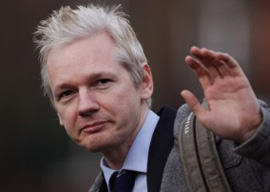
November 13, 2012

Julian Assange
A month later, a Labour/Liberal Democrat-dominated parliamentary select committee relishingly declared their reeling bête noire (his papers” once-fervent Thatcherism has never been forgiven) “not a fit person to exercise the stewardship of a major international company.” Few were willing to defend either his person or his dissipating empire, except his wife Wendy”who gallantly fought off a would-be attacker“and the commendably loyal Michael Gove, who memorably locked horns with Leveson, “delivering his evidence,” chuckled the Guardian, “as if he were addressing, at once, the cheap seats in the back row of the Coliseum, and posterity.” Gove explained patiently, to Leveson’s obvious annoyance:
[S]ometimes good intention can result in the curtailment of individual freedom and an unrealistic expectation of how individuals behave…[the cry that] something must be done often leads to people doing something which isn”t wise.
Similar warnings were made by Private Eye‘s Ian Hislop:
Most of the heinous crimes that came up and have made such a splash in front of this Inquiry have already been illegal. Contempt of court is illegal. Phone tapping is illegal…policemen taking money is illegal. All of these things don”t need a code. We already have laws for them.
But such voices have been in a minority all through these proceedings, as the Inquiry extended first to all tabloid newspapers and was manipulated by single-issue fanatics to critique all of society. Daily Mail editor Paul Dacre and journalist Peter Hitchens were summoned despite there being no suggestion of illegal activity”merely incorrect attitudes. Suspicions of media moral malfeasance must have been reinforced by Daily Express proprietor Richard Desmond‘s shrug that he did not know what “ethical” meant. But no ethical exegesis could have assuaged the frantic concerns of complainants such as End Violence Against Women Coalition, Equality Now, the Joint Council for the Welfare of Immigrants, the London Muslim Centre, Mediawise, Trans Media Watch, or the Irish Traveller Movement, which wailed how “the British Police collude with the media and are increasingly part of the lynch mob.” There were more, yet even hundreds of such submissions would probably not have satisfied Yasmin Alibhai-Brown of the Independent, who detected a “gaping hole” no one else could see:
In the months of evidence gathering at the Leveson Inquiry there’s been no mention of race and ethnic bias or the demonisation of asylum seekers, migrants and blameless Muslims.
Others, less independent but more informed, might have detected a gaping hole somewhere else.
But thanks to the anger of such voices, the awfulness of the Murdochs, and a split in Tory ranks, it seems probable that there will indeed soon be new rules for journalists”almost certainly some perfectly reasonable new procedures, but also possibly yet more truth-chilling ideological guidelines, all in the name of addressing public alarm and avoiding any future offense to anyone. “Who guards the guardians?” Leveson asked at the outset”a good question, and one that will remain unanswered whatever he recommends.